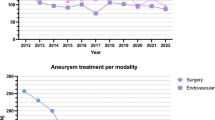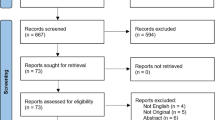Abstract
The purpose of this study was to evaluate time-of-flight magnetic resonance angiography (MRA) in the follow-up of intracranial aneurysms treated with Guglielmi detachable coils (GDCs). From January 1998 to January 2002 27 MRA and intra-arterial digital subtraction angiography (IADSA) examinations were analyzed for residual aneurysms and arterial patency following GDC placement. A total number of 33 intracranial aneurysms was analyzed, including 18 located in the posterior circulation. The MRA analysis was based on source images in combination with maximum intensity projections. The IADSA was used as the reference standard. Two aneurysms were excluded from evaluation, because of susceptibility artefacts from other aneurysms, which were clipped. Sensitivity and positive predictive values of MRA in revealing residual aneurysms were, respectively, 89% and 80%. Specificity in ruling out remnant necks and residual flow around coils was, respectively, 91% and 97%, with a negative predictive value of, respectively, 95% and 100%. Specificity and negative predictive value of MRA for arterial occlusion were, respectively, 87% and 100% for the parent arteries and, respectively, 85% and 100% for the adjacent arteries. MRA is a reliable diagnostic tool in the follow-up of GDC treatment, and it may replace IADSA in excluding residual flow around coils and aneurysmal necks and in ruling out arterial occlusion.




Similar content being viewed by others
References
Guglielmi G, Vinuela F, Dion J, Duckwiler G (1991) Electrothrombosis of saccular aneurysms via endovascular approach. Part 2: preliminary clinical experience. J Neurosurg 75:8–14
Guglielmi G, Vinuela F, Sepetka I, Macellari V (1991) Electrothrombosis of saccular aneurysms via endovascular approach. Part 1: electrochemical basis, technique, and experimental results. J Neurosurg 75:1–7
Mullan S (1974) Experiences with surgical thrombosis of intracranial berry aneurysms and carotid cavernous fistulas. J Neurosurg 41:657–670
Mullan S, Reyes C, Dawley J (1969) Stereotactic copper electric thrombosis of intracranial aneurysms. Prog Neurol Surg 3:193–211
Byrne JV, Adams CB, Kerr RS, Molyneux AJ (1995) Endosaccular treatment of inoperable intracranial aneurysms with platinum coils. Br J Neurosurg 9:585–592
Casasco AE, Aymard A, Gobin YP, Houdart E, Rogopoulos A, George B, Hodes JE, Cophignon J, Merland JJ (1993) Selective endovascular treatment of 71 intracranial aneurysms with platinum coils. J Neurosurg 79:3–10
Guglielmi G, Vinuela F, Duckwiler G, Dion J, Lylyk P, Berenstein A, Strother C, Graves V, Halbach V, Nichols D (1992) Endovascular treatment of posterior circulation aneurysms by electrothrombosis using electrically detachable coils. J Neurosurg 77:515–524
Gurian JH, Vinuela F, Guglielmi G, Gobin YP, Duckwiler GR (1996) Endovascular embolization of superior hypophyseal artery aneurysms. Neurosurgery 39:1150–1156
Massoud TF, Guglielmi G, Vinuela F, Duckwiller GR (1996) Endovascular treatment of multiple aneurysms involving the posterior intracranial circulation. AJNR Am J Neuroradiol 17:549–555
McDougall CG, Halbach VV, Dowd CF, Higashida RT, Larsen DW, Hieshima GB (1996) Endovascular treatment of basilar tip aneurysms using electrolytically detachable coils. J Neurosurg 84:393–399
Rowe JG, Molyneux AJ, Byrne JV, Renowden S, Aziz TZ (1996) Endovascular treatment of intracranial aneurysms: a minimally invasive approach with advantages for elderly patients. Age Ageing 25:372–376
Tateshima S, Murayama Y, Gobin YP, Duckwiler GR, Guglielmi G, Vinuela F (2000) Endovascular treatment of basilar tip aneurysms using Guglielmi detachable coils: anatomic and clinical outcomes in 73 patients from a single institution. Neurosurgery 47:1332–1342
Byrne JV, Molyneux AJ, Brennan RP, Renowden SA (1995) Embolisation of recently ruptured intracranial aneurysms. J Neurol Neurosurg Psychiatry 59:616–620
Graves VB, Strother CM, Duff TA, Perl J 2nd (1995) Early treatment of ruptured aneurysms with Guglielmi detachable coils: effects on subsequent bleeding. Neurosurgery 37:640–648
Matsubara S, Satoh K, Satomi J, Miyamoto T, Uno M, Nagahiro S (2001) Guglielmi detachable coil embolization for ruptured lower-midbasilar trunk aneurysms—a report of five cases. Neuroradiology 43:884–890
Vinuela F, Duckwiler G, Mawad M (1997) Guglielmi detachable coil embolization of acute intracranial aneurysm: perioperative anatomical and clinical outcome in 403 patients. J Neurosurg 86:475–482
Byrne JV, Sohn MJ, Molyneux AJ, Chir B (1999) Five-year experience in using coil embolization for ruptured intracranial aneurysms: outcomes and incidence of late rebleeding. J Neurosurg 90:656–663
Cognard C, Weill A, Spelle L, Piotin M, Castaings L, Rey A, Moret J (1999) Long-term angiographic follow-up of 169 intracranial berry aneurysms occluded with detachable coils. Radiology 212:348–356
Hodgson TJ, Carroll T, Jellinek DA (1998) Subarachnoid hemorrhage due to late recurrence of a previously unruptured aneurysm after complete endovascular occlusion. AJNR Am J Neuroradiol 19:1939–1941
Hope JKA, Burne JV, Molyneux AJ (1999) Factors influencing successful angiographic occlusion of aneurysms treated by coil embolization. AJNR Am J Neuroradiol 20:391–399
Malisch TW, Guglielmi G, Vinuela F, Duckwiler G, Gobin YP, Martin NA, Frazee JGl (1997) Intracranial aneurysms treated with the Guglielmi detachable coil: midterm clinical results in a consecutive series of 100 patients. J Neurosurg 87:176–183
Lin T, Fox AJ, Drake CG (1989) Regrowth of aneurysm sacs from residual neck following aneurysm clipping. J Neurosurg 70:556–560
Todd NC (1990) Aneurysm rebleeding after treatments that leave the aneurysm sac patent. Review article. Br J Neurosurg 4:373–379
Adams WM, Laitt RD, Jackson A (2000) The role of MR angiography in the pretreatment assessment of intracranial aneurysms: a comparative study. Am J Neuroradiol 21:1618–1628
Atlas SW, Sheppard L, Goldberg HI, Hurst RW, Listerud J, Flamm E (1997) Intracranial aneurysms: detection and characterization with MR angiography with use of an advanced postprocessing technique in a blinded-reader study. Radiology 203:807–814
Horikoshi T, Fukamachi A, Nishi H, Fukasawa I (1994) Detection of intracranial aneurysms by three-dimensional time-of-flight magnetic resonance angiography. Neuroradiology 36:203–207
Huston J 3rd, Nichols DA, Luetmer PH, Goodwin JT, Meyer FB, Wiebers DO, Weaver AL (1994) Blinded prospective evaluation of sensitivity of MR angiography to known intracranial aneurysms: importance of aneurysm size. AJNR Am J Neuroradiol 15:1607–1614
Korogi Y, Takahashi M, Mabuchi N, Miki H, Fujiwara S, Horikawa Y, Nakagawa T, O’Uchi T, Watabe T, Shiga H (1994) Intracranial aneurysms: diagnostic accuracy of three-dimensional, Fourier transform, time-of-flight MR angiography. Radiology 193:181–186
Korogi Y, Takahashi M, Mabuchi N, Nakagawa T, Fujiwara S, Horikawa Y, Miki H, O’Uchi T, Shiga H, Shiokawa Y, Watabe T, Furuse M (1996) Intracranial aneurysms: diagnostic accuracy of MR Angiography with evaluation of maximum intensity projection and source images. Radiology 199:199–207
Ross JS, Masaryk TJ, Modic MT, Ruggieri PM, Haacke EM, Selman WR (1990) Intracranial aneurysms: evaluation by MR angiography. AJNR Am J Neuroradiol 155:159–165
Schuierer G, Huk WJ, Laub G (1992) Magnetic resonance angiography of intracranial aneurysms: comparison with intra-arterial digital subtraction angiography. Neuroradiology 35:50–54
Stock KW, Radue EW, Jacob AL, Bao XS, Steinbrich W (1995) Intracranial arteries: retrospective blinded comparative study of MR angiography and DSA in 50 patients. Radiology 195:451–456
Grzyska U, Freitag J, Zeumer H (1990) Selective cerebral intra-arterial DSA. Complication rate and control of risk factors. Neuroradiology 32:296–299
Heiserman JE, Dean BL, Hodak JA (1994) Neurologic complications of cerebral angiography. AJNR Am J Neuroradiol 15:1401–1407
Leffers AM, Wagner A (2000) Neurologic complications of cerebral angiography. A retrospective study of complication rate and patient risk factors. Acta Radiol 41:204–210
Warnock NG, Gandhi MR, Bergvall U, Powell T (1993) Complications of intra-arterial digital subtraction angiography in patients investigated for cerebral vascular disease. Br J Radiol 66:855–858
Waugh JR, Sacharias N (1992) Arteriographic complications in the DSA era. Radiology 182:243–246
Shellock FG, Detrick MS, Brant-Zawadski MN (1997) MR compatibility of Guglielmi detachable coils. Radiology 203:568–570
Anzalone N, Righi C, Simionato F, Scomazzoni F, Pagani G, Calori G, Santino P, Scotti G (2000) Three-dimensional time-of-flight MR angiography in the evaluation of intracranial aneurysms treated with Guglielmi detachable coils. AJNR Am J Neuroradiol 21:746–752
Boulin AB, Pierot L (2001) Follow-up of intracranial aneurysms treated with detachable coils: comparison of gadolinium-enhanced 3D time-of-flight MR angiography and digital subtraction angiography. Radiology 219:108–113
Brunereau L, Cottier JP, Sonier CB, Medioni B, Bertrand P, Rouleau P, Sirinelli D, Herbreteau D (1999) Prospective evaluation of time-of-flight MR angiography in the follow-up of intracranial saccular aneurysms treated with Guglielmi detachable coils. J Comput Assist Tomogr 23:216–223
Derdeyn CP, Graves VB, Turski PA, Masaryk AM, Strother CM (1997) MR angiography of saccular aneurysms after treatment with Guglielmi detachable coils: preliminary experience. AJNR Am J Neuroradiol 18:279–286
Kähära VJ, Seppanen SK, Ryymin PS, Mattila P, Kuurne T, Laasonen EM (1999) MR angiography with three-dimensional time-of-flight and targeted maximum-intensity-projection reconstructions in the follow-up of intracranial aneurysms embolized with Guglielmi detachable coils. AJNR Am J Neurorad 20:1470–1475
Weber W, Yousry TA, Felber SR, Henkes H, Nahser HC, Roer N, Kuhne D (2001) Noninvasive follow-up of GDC-treated saccular aneurysms by MR angiography. Eur Radiol 11:1792–1797
Roy D, Milot G, Raymond J (2001) Endovascular treatment of unruptured aneurysms. Stroke 32:1998–2004
Author information
Authors and Affiliations
Corresponding author
Rights and permissions
About this article
Cite this article
Westerlaan, H.E., van der Vliet, A.M., Hew, J.M. et al. Time-of-flight magnetic resonance angiography in the follow-up of intracranial aneurysms treated with Guglielmi detachable coils. Neuroradiology 47, 622–629 (2005). https://doi.org/10.1007/s00234-005-1395-3
Received:
Accepted:
Published:
Issue Date:
DOI: https://doi.org/10.1007/s00234-005-1395-3




